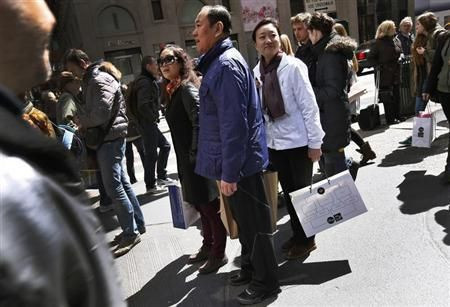Extended Visas For Chinese Citizens May Bring $85 Billion A Year To The US

While attending the Asia-Pacific Economic Conference in Beijing, U.S. President Barack Obama announced new rules on existing visas for Chinese citizens, allowing students to extend their stays in the United States by five years and allowing business and tourist visas to be valid for as long as 10 years. Obama said the extended visa parameters will foster new economic ties and strengthen those that already exist, potentially bringing a lot of money into the U.S. -- as much as $85 billion a year.
The new measures make coming and staying in the U.S. much easier for Chinese citizens, who for the most part had to apply or renew visas on an annual basis. The same changes apply to U.S. visitors to China.
“As a result of this arrangement, the United States hopes to welcome a growing share of eligible Chinese travelers, inject billions into the U.S. economy and create enough demand to support hundreds of thousands of additional U.S. jobs,” the White House statement said, adding by 2021, Chinese travelers to the U.S. will contribute an estimated $85 billion a year and create a possible 440,000 jobs.
Though China-U.S. relations have experienced some tensions related to disagreements in the South China Sea and other issues like cyberspying, economic relations between the two are intricately entwined. For the U.S., Chinese tourists spend more money than all other nationalities.
According to data by Brand USA, a tourism initiative launched by the U.S. government, Chinese tourists spent $9.8 billion in 2013 during visits to the United States. The statistics also indicate the average Chinese tourist spends $5,400 during a trip, which is about 21 percent more than the average international visitor, to the advantage of American airlines, tour services, hotels and retail brands. With the new rules, the White House projected Chinese tourists could hit 7.3 million by 2021.
The new visas targeted toward students, tourists and businessmen give unprecedented access to the Chinese demographic groups that most frequently travel to the U.S. Vacation or visiting relatives is the No. 1 reason Chinese choose to visit, representing 53 percent of inbound passengers. Business, on the other hand, has seen a 3 percent decrease from 2012 to 2013.
Difficulty in obtaining business visas for visitors entering either country has been a point of difficulty in the past, and likely a contributing factor to the decline in business-related visits. According to a report by the Wall Street Journal, the American Chamber of Commerce in China cited the chamber and other businesses that have received complaints about the process in sending Chinese executives to the U.S. for meetings, training and other business-related visits.
China’s Foreign Ministry confirmed the new extended period visas for Chinese citizens, saying they are effective as of Wednesday.
© Copyright IBTimes 2024. All rights reserved.





















